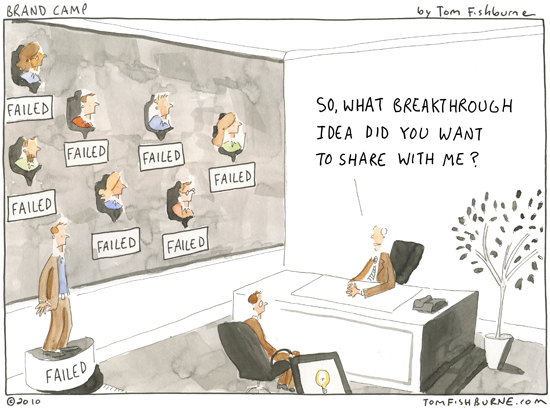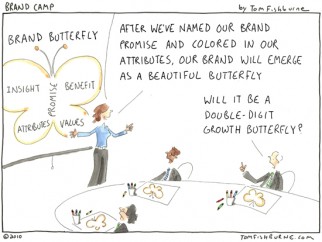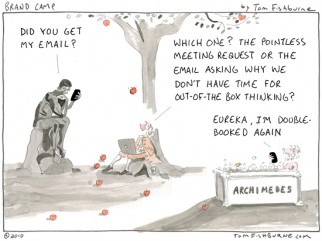David Kelley at IDEO once said that you have to “fail faster to succeed sooner”.
You can tell a lot about an organization by how they treat failure. Do they focus on the learning or do they focus on the punishment?
When I worked at General Mills, they launched a new snack brand called Wahoos to take on Frito-Lay. The launch failed. Many who worked on the snack development project were let go. It created something we called the Wahoos hangover. In the midst of product development, someone would invariably say, “we don’t want another Wahoos” and the team would choose to take the safest course of action.
Many companies have a form of Wahoos hangover. Successes are celebrated, but failures are turned into cautionary tales. The result is that the riskier (and potentially more breakthrough) ideas are dismissed or watered down.
David Kelley’s maxim encourages prototyping to facilitate early learning. Early failures guide the innovation process, so there is greater chance for success at launch.
 My friend Kaj Johnson gave me a failed prototype from a low point in a project he helped develop. All of team’s effort had been focused on one particular project direction. Yet they couldn’t get the economics to work. So Kaj inked the letters “F-A-I-L” on the side the prototype and placed it on the table in front of the team. The act of designating the prototype as a failure allowed the team to finally let go on that particular direction and find a breakthrough in another direction altogether. There was no finger-pointing. It was just a matter-of-fact acknowledgement that failure is a part of the process. Through this failure, the team achieved greater success.
My friend Kaj Johnson gave me a failed prototype from a low point in a project he helped develop. All of team’s effort had been focused on one particular project direction. Yet they couldn’t get the economics to work. So Kaj inked the letters “F-A-I-L” on the side the prototype and placed it on the table in front of the team. The act of designating the prototype as a failure allowed the team to finally let go on that particular direction and find a breakthrough in another direction altogether. There was no finger-pointing. It was just a matter-of-fact acknowledgement that failure is a part of the process. Through this failure, the team achieved greater success.
I keep the failed prototype on my desk as a reminder to celebrate and learn from failure. Failures are usually more instructive than successes.



Mark J Owen says
Hi Tom,
Excellent cartoon.
And you are spot on about the an organisation’s perception of failure. It seems that there are lots of examples of companies that weren’t afraid to “embrace” failure.
[Lokking forward to your next cartoon]
– Mark
http://markjowen.wordpress.com
Mark J Owen says
That should be “Looking forward to…”, not “Lokking” :O)
Scott says
What is worse, failing or not trying at all?
-Scott.
Jonathan Asher says
These days, the equivalent of “we don’t want another Wahoos” referred to here as a way to avoid a big failure in new products is “we don’t want to do a Tropicana” relating to an embarassing mistake when redesigning one’s packaging.
The problem is still one of mis-applying the lesson. Many marketers take the lesson from the Tropicana fiasco to be don’t make too big too big a change, when, in fqact, the lesson should be make the right change for the situation – which Tropicana’s was not. There is still a place for a big chnage – and sometimes playing it too safe is, in fact, the riskier move for a brand’s long term success.
Jonathan Asher
SVP, Perception Reserach Services
Tim Johnson says
Reminds me of the IBM legend, where Tom Watson called a VP into his office after a $5MM project failed. Watson is alleged to have asked the VP why he was there. The VP replied, “I expect to fire me.” Watson’s legendary reply was, “Why would I want to fire you? I just spent $5MM on your education.”
We learn more from the bridges that fall down than from the ones that stay standing. If you are not failing somewhere, you’re not learning as much as you can.
Bob Hatcher says
I’m pretty sure that is Lee Ioacca, not Tom Watson, and it was a $100 million failure. But, the point is valid.
Misty Funk says
“Failures are usually more instructive than successes.” How much more true can you get? We hope for small…or inexpensive failures, right? Yet, failure can be the stimulus for something better!
Bob Hatcher says
Sorry, I’ve got to disagree. Many people think that you can learn more from failure than from success. But, if you were learning a new sport, say golf. Would you go to the driving range and watch the worst person there and try to fix their stuff? Or, would you try to emulate the best person?
My mantra has always been “You can’t learn excellence from studying failure.” You can probably learn to be pretty good, but not great.
Sonya Duran says
An agency I read about had a whole wall covered in tiny tiles that read “Fail Harder”
I thought it was a great reminder for the employees (and me, too).
I now find myself telling my son the same thing. It’s better to try and fail, then never try at all.
– Sonya Duran
Ameritest
graeme says
The opposite of failure is irrelevance
Zorro says
You can see it all around you.
Companies fail to take risks, and dish out one mediocre product after another.
Sigh!
(I’m as guilty as the rest of them)
Jweb says
This is very true in illustration and songwriting. You’ve got to create many failures to get to the right solution. The trick, I think, is to enjoy the failures as much as the successes. More fuel for the fire. Thanks for the inspiration.
Bob Hatcher says
Recently, I wrote on this topic on LinkedIn. The article is called “Hey CEOs, Do You Really Celebrate Failure?” https://www.linkedin.com/pulse/hey-ceos-do-you-really-celebrate-failure-bob-hatcher/
Bob Hatcher says
I’m pretty sure that is Lee Ioacca, not Tom Watson, and it was a $100 million failure. But, the point is valid.